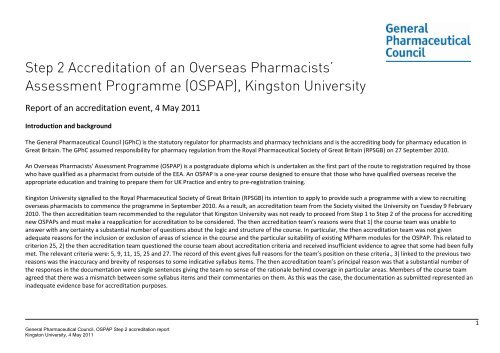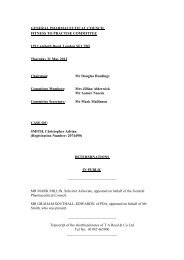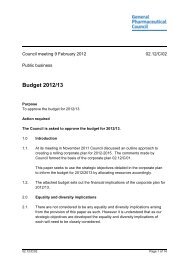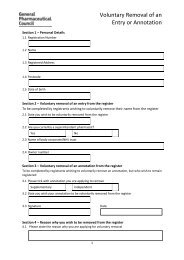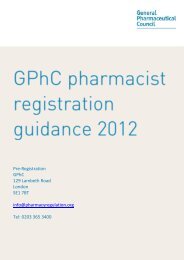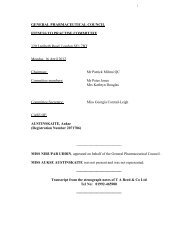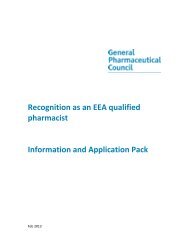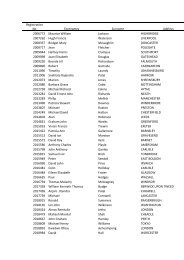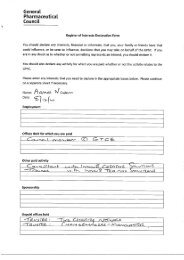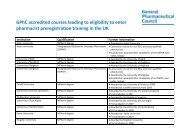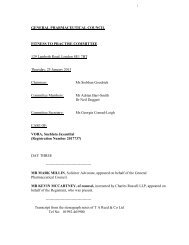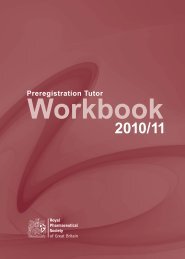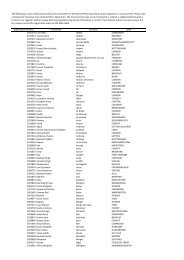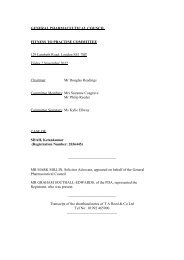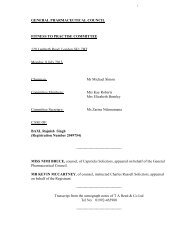Step 2 Accreditation 2010/11 - General Pharmaceutical Council
Step 2 Accreditation 2010/11 - General Pharmaceutical Council
Step 2 Accreditation 2010/11 - General Pharmaceutical Council
Create successful ePaper yourself
Turn your PDF publications into a flip-book with our unique Google optimized e-Paper software.
<strong>Step</strong> 2 <strong>Accreditation</strong> of an Overseas Pharmacists’<br />
Assessment Programme (OSPAP), Kingston University<br />
Report of an accreditation event, 4 May 20<strong>11</strong><br />
Introduction and background<br />
The <strong>General</strong> <strong>Pharmaceutical</strong> <strong>Council</strong> (GPhC) is the statutory regulator for pharmacists and pharmacy technicians and is the accrediting body for pharmacy education in<br />
Great Britain. The GPhC assumed responsibility for pharmacy regulation from the Royal <strong>Pharmaceutical</strong> Society of Great Britain (RPSGB) on 27 September <strong>2010</strong>.<br />
An Overseas Pharmacists' Assessment Programme (OSPAP) is a postgraduate diploma which is undertaken as the first part of the route to registration required by those<br />
who have qualified as a pharmacist from outside of the EEA. An OSPAP is a one‐year course designed to ensure that those who have qualified overseas receive the<br />
appropriate education and training to prepare them for UK Practice and entry to pre‐registration training.<br />
Kingston University signalled to the Royal <strong>Pharmaceutical</strong> Society of Great Britain (RPSGB) its intention to apply to provide such a programme with a view to recruiting<br />
overseas pharmacists to commence the programme in September <strong>2010</strong>. As a result, an accreditation team from the Society visited the University on Tuesday 9 February<br />
<strong>2010</strong>. The then accreditation team recommended to the regulator that Kingston University was not ready to proceed from <strong>Step</strong> 1 to <strong>Step</strong> 2 of the process for accrediting<br />
new OSPAPs and must make a reapplication for accreditation to be considered. The then accreditation team’s reasons were that 1) the course team was unable to<br />
answer with any certainty a substantial number of questions about the logic and structure of the course. In particular, the then accreditation team was not given<br />
adequate reasons for the inclusion or exclusion of areas of science in the course and the particular suitability of existing MPharm modules for the OSPAP. This related to<br />
criterion 25, 2) the then accreditation team questioned the course team about accreditation criteria and received insufficient evidence to agree that some had been fully<br />
met. The relevant criteria were: 5, 9, <strong>11</strong>, 15, 25 and 27. The record of this event gives full reasons for the team’s position on these criteria., 3) linked to the previous two<br />
reasons was the inaccuracy and brevity of responses to some indicative syllabus items. The then accreditation team’s principal reason was that a substantial number of<br />
the responses in the documentation were single sentences giving the team no sense of the rationale behind coverage in particular areas. Members of the course team<br />
agreed that there was a mismatch between some syllabus items and their commentaries on them. As this was the case, the documentation as submitted represented an<br />
inadequate evidence base for accreditation purposes.<br />
<strong>General</strong> <strong>Pharmaceutical</strong> <strong>Council</strong>, OSPAP <strong>Step</strong> 2 accreditation report<br />
Kingston University, 4 May 20<strong>11</strong><br />
1
The University resubmitted documentation in May <strong>2010</strong> and a re‐visit by a Society accreditation team took place on 16 June <strong>2010</strong>. At this visit, the accreditation team<br />
agreed to recommend to the Society’s Education Committee that the Kingston University OSPAP be recognised in the first instance for a period of one year, subject to<br />
two conditions. Thus, the University was allowed to enrol students in September <strong>2010</strong>. The conditions were 1) that module descriptors be rewritten to accurately reflect<br />
the curriculum content. Whilst the individual elements of the indicative syllabus had been satisfied as evidenced by the School’s oral submission, neither the written<br />
submission nor the current module descriptors supported this. This related to criterion 25. The rewritten module descriptors must be submitted to the Society’s<br />
<strong>Accreditation</strong> Department for approval by 16 July <strong>2010</strong>, and 2) that the advertising booklet for students be rewritten and submitted to the Society’s accreditation team<br />
for review prior to dissemination. During the visit the accreditation team was reassured to hear from the Associate Dean of the University’s commitment to supporting<br />
the Kingston OSPAP.<br />
The <strong>Step</strong> 2 visit detailed within this accreditation record followed the <strong>General</strong> <strong>Pharmaceutical</strong> <strong>Council</strong>’s September <strong>2010</strong> accredited processes and reaccreditation was to<br />
the GPhC’s interim standards for accreditation ofOverseas Pharmacy Assessment Programme.<br />
Documentation<br />
Following receipt of the provider’s submission documentation, a pre‐visit meeting was held on 28 March 20<strong>11</strong>, at which the meetings’ schedule and any additional<br />
documentation requirements were agreed. The pre‐visit meeting was attended by the accreditation team leader, the GPhC <strong>Accreditation</strong> and Recognition Manager and<br />
the provider’s representatives.<br />
The following documents were submitted by the provider in advance of the step 2 accreditation visit:<br />
1. Document for <strong>Accreditation</strong> of the Postgraduate diploma in Pharmacy practice (OSPAP) <strong>Step</strong> 2<br />
The following documents were submitted by the provider during the step 2 accreditation visit:<br />
2. Compendium of module guides<br />
3. Variances in module guides from module descriptors document<br />
4. Placements and feedback document<br />
5. SSCC minutes 27/10/10<br />
6. SSCC minutes 10/03/<strong>11</strong><br />
7. PYM010‐PYM080 module boxes<br />
<strong>General</strong> <strong>Pharmaceutical</strong> <strong>Council</strong>, OSPAP <strong>Step</strong> 2 accreditation report<br />
Kingston University, 4 May 20<strong>11</strong><br />
2
The visit<br />
The step 2 accreditation visit took place on the 4 th May 20<strong>11</strong> at the Department of Pharmacy, Kingston University. A private meeting of the accreditation team was held<br />
on the 3rd May 20<strong>11</strong>.<br />
The visit comprised a series of meetings at the University. The meetings were with senior School staff to discuss strategic issues, course staff to discuss the syllabus,<br />
student representatives, and senior University officers. The accreditation team also had the opportunity to meet with 10 students representing the entirety of the<br />
current cohort.<br />
The <strong>Accreditation</strong> Team:<br />
The GPhC accreditation team (‘the team’) comprised:<br />
Name Designation at the time of accreditation event<br />
Mrs Linda Stone *<br />
<strong>Accreditation</strong> team leader, pharmacy consultant, past President of RPSGB, community<br />
pharmacy background<br />
Professor Larry Gifford <strong>Accreditation</strong> team member (academic), Professor of Pharmacy Education and Deputy Head of<br />
School, Keele University School of Pharmacy<br />
Dr Brian Curwain <strong>Accreditation</strong> team member (International Panel), Freelance pharmacist consultant to NHS and<br />
industry, Past Chair, English Pharmacy Board, member of International Panel of GPhC, former<br />
PCT head of medicines management<br />
Mr Surinder Bassan <strong>Accreditation</strong> team member (pharmacist, hospital), Chief Pharmacist, Southampton Universities<br />
Hospital and member of International Panel of GPhC<br />
along with:<br />
Name Designation at the time of visit<br />
Ms Joanne Martin* <strong>Accreditation</strong> and Recognition Manager, <strong>General</strong> <strong>Pharmaceutical</strong> <strong>Council</strong><br />
Ms Martha Pawluczyk** Registration Manager, <strong>General</strong> <strong>Pharmaceutical</strong> <strong>Council</strong><br />
Ian Marshall Rapporteur<br />
*attended pre‐visit meeting<br />
**attended the Day 1 private meeting of the accreditation team only<br />
<strong>General</strong> <strong>Pharmaceutical</strong> <strong>Council</strong>, OSPAP <strong>Step</strong> 2 accreditation report<br />
Kingston University, 4 May 20<strong>11</strong><br />
3
There were no conflicts of interest expressed by members of the accreditation team. The Vice Chancellor declared that he is a member of the GMC accreditation team at<br />
Keele University School of Medicine. This was not regarded as a conflict of interest.<br />
The accreditation criteria<br />
Criteria (See Appendix 1)<br />
Outcomes: the graduate…<br />
(criteria 1‐17)<br />
Processes: the student…<br />
(criteria 18‐‐24)<br />
Processes: the OSPAP…<br />
(criteria 25‐32)<br />
<strong>Accreditation</strong> team’s commentary<br />
The accreditation team agreed that all 17 criteria in this section had been met. The team noted that the OSPAP students were<br />
enthusiastic adult learners who were enjoying a worthwhile course. Students were comfortable with the UK requirements in<br />
law and professional matters and were conversant with the area of ethical dilemmas and decision‐making. The team found the<br />
students somewhat vague on the subjects of medicines management and pharmaceutical care. The team noted that the<br />
Department conducted diagnostic testing of prior knowledge during the induction week and provided remedial support where<br />
required. Students expressed themselves as wishing to become pharmacists and queried the inclusion of so much science and<br />
critical analysis in the OSPAP; the Department indicated that it wished to dispel this view of modern pharmacy provision.<br />
The accreditation team agreed that all 7 criteria in this section had been met. The team noted that students were comfortable<br />
with the concept of continued professional development and with the UK standards of conduct, ethics and performance.<br />
Students arrange their own placement in community pharmacy in Semester 1, often in the pharmacy where they regularly<br />
work. Staff opined that this system had both positive (familiarity with the environment) and negative (possibility of bias)<br />
aspects. It was stressed that some students lived long distances from the University and hence a placement close to their<br />
home was advantageous. It was also stressed that students were required to complete workbooks relating to the placement to<br />
differentiate it from a normal working day. The accreditation team was of the view that the students selecting their own<br />
placement represented poor academic practice and would have preferred to have seen students working on neutral territory.<br />
The accreditation team agreed that all 8 criteria in this section had been met. The course director and module leaders indicated<br />
that the course had gone well and that there had been no problems with the delivery. It was reported that the attitude of the<br />
students had been very professional and that they had been a pleasure to teach. The accreditation team was told that the<br />
practice of co‐teaching parts of the OSPAP with the MPharm had both advantages and disadvantages. In this respect, students<br />
interviewed expressed the view that they were often confused as to whether they were being treated as undergraduate or<br />
postgraduate students. The team was told that the Department planned to introduce more separate teaching for the two<br />
cohorts in the next teaching year. Students commented that they found very confusing the departmental practice of referring<br />
to modules by code rather than by title, a view with which the accreditation team concurred.<br />
<strong>General</strong> <strong>Pharmaceutical</strong> <strong>Council</strong>, OSPAP <strong>Step</strong> 2 accreditation report<br />
Kingston University, 4 May 20<strong>11</strong><br />
4
The teaching fellows are pharmacists working in practice and hence are aware of the latest developments in the practice area.<br />
Teachers in pharmacy practice keep up‐to‐date with developments in the profession and on the science side, students<br />
undertake critical evaluations of research papers. The team was surprised to learn that the Department did not have as part of<br />
its quality approach an agreed method of providing lecture information to students, rather it being left to individual teachers to<br />
decide on their own method. The team did not regard this as good practice. The accreditation team also noted some<br />
indications of student dissatisfaction with the feedback on assignments. The teaching team indicated that because of the small<br />
cohort size it was possible to give individual feedback, but it was also stated that group feedback is given at the end of some<br />
modules. The accreditation team was told that the Department had made little progress in developing interprofessional<br />
learning since the <strong>Step</strong> 1 visit. The team was told that no other healthcare professions were on the site and that the timetable<br />
issues with St George’s Hospital Medical School continued to be insoluble. The accreditation team accepted this explanation<br />
and, noting that this criterion is currently not mandatory, agreed that the criterion was met. However, it was pointed out to the<br />
Department that the new GPhC standards for both MPharm and OSPAP degrees demand an element of interprofessional<br />
learning. Accordingly, it will be a recommendation of this record that that the University should use its best endeavours to<br />
explore teaching and learning opportunities with students of other healthcare professions.<br />
Structures<br />
(criteria 33‐42)<br />
The accreditation team agreed that all 10 criteria in this section had been met. The accreditation team noted comments in the<br />
minutes of the Staff Student Consultative Committee concerning the shortage of books in the library. Students interviewed<br />
described the library as always being crowded. The documentation stated that the library purchases recommended textbooks<br />
in the ratio of one book per ten students. The team was satisfied by a statement from the Information Specialist (Science) that<br />
he maintained a watching brief on usage of books and both he and the Acting Dean indicated that the library was prepared to<br />
purchase extra copies if the need arose. The accreditation team was cognisant of the fact that since the <strong>Step</strong> 1 visit the<br />
University, through an error that was no fault of the Department of Pharmacy, had admitted 50 additional students to Year 1 of<br />
the MPharm programme in September <strong>2010</strong>. The team was told that the University had acknowledged that the Department of<br />
Pharmacy required extra resource to cope with this temporary increased student load and that extra fixed‐term appointments<br />
had been made for the next 2 years. The team leader indicated that the GPhC would expect this extra support to be maintained<br />
throughout the period that the extra students would be on course in order that neither the MPharm nor OSPAP provisions<br />
would be compromised. The Acting Dean indicated that there was uncertainty about the figures quoted in the original business<br />
plan in the current financial climate for universities but he was comfortable that the funding level to the OSPAP programme<br />
would be preserved. Likewise, the Vice Chancellor, although unable to promise the precise sums that would be available,<br />
indicated that the University would continue to support pharmacy at appropriate levels to maintain the student:staff ratio.<br />
<strong>General</strong> <strong>Pharmaceutical</strong> <strong>Council</strong>, OSPAP <strong>Step</strong> 2 accreditation report<br />
Kingston University, 4 May 20<strong>11</strong><br />
5
Summary and conclusions<br />
This conclusion concerns the first part of the two‐part step 2 accreditation event. The second part of the event is a return visit to the University by the team leader and<br />
the Head of Education and Quality Assurance to confirm the appropriate conduct of the assessment process for the <strong>2010</strong>/20<strong>11</strong> academic year in July 20<strong>11</strong>.<br />
In reaching its conclusion based on this <strong>Step</strong> 2 visit, the accreditation team made two separate judgements:<br />
1. whether or not the University met the criteria for a new provider delivering a new OSPAP; and<br />
2. whether or not the University met the criteria for an established provider delivering an existing OSPAP<br />
The accreditation team agreed that both sets of criteria had been met, subject to conditions and recommendations.<br />
Consequently, the accreditation team agreed to recommend to the Registrar of the GPhC that Kingston University be permitted to progress from the process for the<br />
accreditation of a new OSPAP to the process for the accreditation of an existing OSPAP. The result of this is that Kingston University now delivers a fully accredited<br />
OSPAP, subject to the confirmatory visit later in July.<br />
The accreditation team also agreed to recommend to the Registrar that Kingston University be accredited as an OSPAP provider for a period of three years .<br />
There are no conditions.<br />
There is one recommendation:<br />
1) that the University should use its best endeavours to explore teaching and learning opportunities with students of other healthcare professions. This is to meet<br />
criterion 31.<br />
The accreditation team was pleased to hear the Vice Chancellor’s assurance of the University’s continued support for the pharmacy provision and his view on the<br />
standard of the student experience at Kingston University.<br />
The team leader and the Head of education and Quality Assurance will return to the University on 5 July 20<strong>11</strong> for the second part of the <strong>Step</strong> 2 accreditation to check<br />
that the assessment process has been conducted appropriately. At this meeting, the views of external examiners will be sought. They will be asked the following:<br />
- whether all graduating students have met all the learning outcomes of the course;<br />
<strong>General</strong> <strong>Pharmaceutical</strong> <strong>Council</strong>, OSPAP <strong>Step</strong> 2 accreditation report<br />
Kingston University, 4 May 20<strong>11</strong><br />
6
- whether the course is securely at Master’s level;<br />
- whether the assessment process has been conducted fully in accordance with relevant academic regulations;<br />
- whether there are any issues which would or could have the potential to affect academic standards in the future.<br />
Satisfactory answers to all of these questions must be obtained. Accordingly, the Head of education and Quality Assurance will inform the Registrar of this outcome, so<br />
that he can confirm full accreditation on behalf of the <strong>General</strong> <strong>Pharmaceutical</strong> <strong>Council</strong>.<br />
The Head of Education and Quality Assurance will also inform the Preregistration Department of the <strong>General</strong> <strong>Pharmaceutical</strong> <strong>Council</strong> that the OSPAP is now fully<br />
accredited so that any signed pass list submitted by Kingston University to the Preregistration Department of the <strong>General</strong> <strong>Pharmaceutical</strong> <strong>Council</strong> can be used to confirm<br />
that the students on the list can be permitted to begin preregistration training. The visiting team will direct the School to inform the OSPAP students of this process.<br />
The team leader reminded the University of the following:<br />
- The <strong>General</strong> <strong>Pharmaceutical</strong> <strong>Council</strong> has assumed responsibility for the regulation of pharmacy education. The Pharmacy Order, the legislation establishing the<br />
<strong>General</strong> <strong>Pharmaceutical</strong> <strong>Council</strong> as regulator, states that the <strong>General</strong> <strong>Pharmaceutical</strong> <strong>Council</strong> accept previous decisions of the Society. In this context, that means<br />
previous accreditation decisions of the Society will stand.<br />
- The recommendations of the accreditation team are not binding on the Registrar and the Registrar may add, remove or modify points on reflection and in light of the<br />
accreditation panel views.<br />
- The <strong>General</strong> <strong>Pharmaceutical</strong> <strong>Council</strong>’s record and report will be sent to the University shortly to comment on factual accuracy. The providers must respond to the<br />
definitive version of the record and report within three months of receipt.<br />
- Thereafter the summary report, along with the University’s response, will be published on the <strong>General</strong> <strong>Pharmaceutical</strong> <strong>Council</strong>’s website and remain for the duration<br />
of the accreditation period. The record remains confidential to the institution and the <strong>General</strong> <strong>Pharmaceutical</strong> <strong>Council</strong>.<br />
- All accredited providers are required to inform the <strong>General</strong> <strong>Pharmaceutical</strong> <strong>Council</strong> annually of changes to the curriculum and/or resources.<br />
The accreditation team’s feedback is confidential until it has been ratified by the Registrar of the <strong>General</strong> <strong>Pharmaceutical</strong> <strong>Council</strong>.<br />
Following the above event, a <strong>Step</strong> 2 part 2 confirmatory visit was conducted on 5 July 20<strong>11</strong>. Following positive responses from the External Examiners<br />
at this visit the accreditation team’s recommendation for accreditation remained.<br />
The Registrar of the <strong>General</strong> <strong>Pharmaceutical</strong> <strong>Council</strong> subsequently agreed with the accreditation team’s recommendations and approved the Kingston<br />
University OSPAP for accreditation for a period of three years.<br />
<strong>General</strong> <strong>Pharmaceutical</strong> <strong>Council</strong>, OSPAP <strong>Step</strong> 2 accreditation report<br />
Kingston University, 4 May 20<strong>11</strong><br />
7
Appendix 1<br />
Prerequisite with regard to entry to the OSPAP<br />
All OSPAP entrants must have satisfied all relevant requirements of the GPhC’s International Panel<br />
at the successful conclusion of the OSPAP, the graduate…<br />
1. takes personal responsibility for his/her learning, developing a foundation for subsequent continuing professional development,<br />
2. can communicate effectively, orally and in writing, with his/her teachers and peers, as a sound basis for future interaction with patients, carers and other healthcare<br />
professionals,<br />
3. can undertake structured problem‐solving,<br />
4. is able to recognise ethical dilemmas in healthcare and science, and understands ways in which these might be managed by healthcare professionals, whilst taking<br />
account of relevant law,<br />
5. appreciates and has an understanding of main sources of drugs; ways in which drugs are purified, characterised and analysed; their physico‐chemical properties; and<br />
properties drugs display as biologically active molecules in living systems,<br />
6. has an understanding of the design, manufacture and performance of drug dosage forms and is able critically to appreciate the inter‐relationship between<br />
formulation, drug delivery and therapeutic effectiveness,<br />
7. understands how medicines are developed, manufactured and brought to the market place,<br />
8. has proved him/herself capable of performing pharmaceutical calculations accurately,<br />
9. has the capability to prepare extemporaneously any medicine for which this would be regarded as the normal means of provision, including by aseptic technique,<br />
10. is able to interpret and evaluate, for safety, quality, efficacy and economy, prescriptions and other orders for medicines, and to advise patients and other healthcare<br />
professionals about medicines and their usage,<br />
<strong>General</strong> <strong>Pharmaceutical</strong> <strong>Council</strong>, OSPAP <strong>Step</strong> 2 accreditation report<br />
Kingston University, 4 May 20<strong>11</strong><br />
8
<strong>11</strong>. is aware of and understands systems for the quality assurance of products and pharmaceutical services. This includes the management of risk,<br />
12. is able to design, improve, and operate within standard operating procedures, including Patient Group Directions,<br />
13. is able to supply medicines in accordance with legal and professional requirements,<br />
14. can undertake critical appraisal of information or conjecture in all forms of presentation,<br />
15. can apply appropriate approaches and methods to manage scientific and practice problems,<br />
16. has a foundation of knowledge, understanding and skills for promoting good health; diagnosing disease; and prescribing medicines,<br />
17. understands and can explain concepts of medicines management and pharmaceutical care.<br />
Processes<br />
the student…<br />
18. is inculcated with a concern for the patient, normally above other considerations,<br />
19. gains first‐hand structured experience of practice, including contact with patients and practitioners of other healthcare professions,<br />
20. is required to communicate with individuals and audiences,<br />
21. is required to apply, library and other information resources,<br />
22. is required to apply routinely, word‐processing, spreadsheet, database, e‐mail and information retrieval computer applications,<br />
23. has brought to his/her attention the continuing professional development opportunities open to practising pharmacists,<br />
24. Is encouraged to seek networking opportunities in professional pharmacy organisations<br />
the OSPAP…<br />
<strong>General</strong> <strong>Pharmaceutical</strong> <strong>Council</strong>, OSPAP <strong>Step</strong> 2 accreditation report<br />
Kingston University, 4 May 20<strong>11</strong><br />
9
25. is planned with reference to the indicative syllabus appended and students’ prior learning.<br />
26. seeks to develop students' skills of self‐management, teamworking and peer assessment,<br />
27. has the features of positioning knowledge, understanding and skills in a pharmaceutical context and with reference to pharmacy practice,<br />
28. in the processes of curriculum review and development, benefits from the academic staff properly taking account of major advances and developments potentially<br />
impacting on pharmacy,<br />
29. features a variety of approaches to achieving and assessing learning appropriate to its stated objectives, including lectures, practical classes, seminars, workshops,<br />
tutorials, computer‐based/aided learning, clinical visits, problem‐solving exercises, essays and other assignments, and examinations,<br />
30. includes significant staff‐led or supervised time devoted to the topics of British pharmacy law and professional requirements, and their applications in practice, this<br />
being in addition to the assimilation of legal and professional requirements into a substantial proportion of a dispensing practical course,<br />
31. where appropriate and possible, has the student taught and learning alongside and together with students of other healthcare professions,<br />
32. has pharmacy teaching taking place alongside and with reference to research and other postgraduate activities.<br />
Structures<br />
33. For its proper ethos, quality assurance, and scientific and professional leadership, the OSPAP is within the control of, and predominantly delivered by, an<br />
autonomous school or department of pharmacy,<br />
34. accommodation, human, equipment, and other resources available to the school or department of pharmacy are sufficient for the effective delivery of the OSPAP to<br />
planned numbers of students, properly taking account of the full teaching, research and other commitments of the unit,<br />
35. the school or department of pharmacy applies an appropriately expert academic staff, including such in the practice of pharmacy, to the delivery of the OSPAP<br />
36. teacher‐practitioners and visiting lecturers from community and hospital pharmacy practice, and appropriate persons from other healthcare professions are involved<br />
in teaching/support for learning and assessment,<br />
37. the student has access to a personal tutor or tutors for academic guidance and pastoral care,<br />
<strong>General</strong> <strong>Pharmaceutical</strong> <strong>Council</strong>, OSPAP <strong>Step</strong> 2 accreditation report<br />
Kingston University, 4 May 20<strong>11</strong><br />
10
38. there is an active staff‐student consultative committee,<br />
39. pharmacy law, professional requirements and practice are taught ‐ predominantly by pharmacists ‐ from within the identifiable organisational unit which provides<br />
the bulk of teaching and other support for learning for the OSPAP,<br />
40. there is assessment of competence in dispensing by either one examination at the end of the dispensing course, taken under full examination conditions with an<br />
external examiner present; or a series of tests taken under examination conditions, with an external examiner having the right to attend any of the practical tests<br />
and attending some part of the assessment every year. The external examiner is associated with the overall assessment,<br />
41. there is a requirement for achievement of a satisfactorily high standard in assessments of both dispensing practice, and pharmacy law and professional<br />
requirements, irrespective of the student's performance in other subjects. Compensation of marks for these subjects is not allowed and success in these subjects is a<br />
condition for successful completion of the OSPAP,<br />
42. regulations governing the OSPAP are based on those applying to the MPharm degree course of the school or department.<br />
Indicative syllabus<br />
The patient<br />
The patient is the main or ultimate focus of everything in the OSPAP course. The items grouped under this heading address the biological, environmental, psychological<br />
and some of the social foundations of treatment with medicines.<br />
1. The unique role of the pharmacist in ensuring that the patient benefits from pharmaceutical intervention.<br />
2. Principles and methodologies of the social and behavioural sciences relevant to pharmacy.<br />
3. Health and illness: definitions and perceptions.<br />
4. Theory and practice of personal and inter‐personal skills, including written and verbal communication skills, and study skills.<br />
5. The ideas and approaches of compliance or concordance in health care provision, particularly as they apply to medicines‐taking.<br />
6. The pharmacist’s contribution to the promotion of good health and disease prevention.<br />
7. Normal and abnormal bodily function: biochemistry, genetics, microbiology, nutrition, immunology, physiology, pathology, pathophysiology and infective processes.<br />
<strong>General</strong> <strong>Pharmaceutical</strong> <strong>Council</strong>, OSPAP <strong>Step</strong> 2 accreditation report<br />
Kingston University, 4 May 20<strong>11</strong><br />
<strong>11</strong>
8. Aetiology and epidemiology of major diseases and the principles of their drug treatment.<br />
9. Symptoms recognition and management, the principles of differential diagnosis, important diagnostic methods and tests, and medical terminology.<br />
10. Disease management and care planning, including application of clinical guidelines, prescribing and medication review.<br />
<strong>11</strong>. Complementary therapies.<br />
12. Drug and substance misuse, and physiological and psychological dependence. Clinical toxicology associated with drug over‐dosage, drug or substance misuse or<br />
accidental exposure.<br />
Medicines : drug action<br />
The focus here is on drugs in use, particularly in the patient. The first three items in this short list are large in scale and high in importance.<br />
13. Molecular basis of drug action and the actions of drugs within living systems; molecular, cellular, biological, and physical aspects.<br />
14. Clinical therapeutic uses of drugs and medicines in man, including contraindications for, adverse reactions to, and interactions of drugs, and their relevance to<br />
treatment.<br />
15. Drug absorption, distribution, metabolism and excretion and influences thereon, including formulation, route of administration, dosage regimen, ageing and disease.<br />
16. Clinical evaluation of new and existing drugs and medicines, and post‐marketing surveillance. Good Clinical Practice.<br />
17. Prospects for new approaches in therapeutics.<br />
Medicines : the drug substance<br />
For patient safety and often for the quality and efficacy of treatment, it is important that the pharmacist, uniquely among the team of health professionals, has an<br />
appreciation and understanding of the sources and properties of the drugs which form the biologically‐active and therapeutic components of medicines.<br />
18. Sources and purification of substances used in medicine of biotechnological, chemical synthetic, immunological, mineral and plant origin.<br />
19. Physico‐chemical aspects of drugs and biological systems, including thermodynamics and chemical kinetics.<br />
20. Specifications of substances used in medicine, including physical and chemical tests.<br />
21. Analytical methods: principles, design, development, validation and application.<br />
22. Prediction of drug properties, including chemical compatibilities, from molecular structure.<br />
23. Drug design and discovery: principles, approaches and future prospects.<br />
<strong>General</strong> <strong>Pharmaceutical</strong> <strong>Council</strong>, OSPAP <strong>Step</strong> 2 accreditation report<br />
Kingston University, 4 May 20<strong>11</strong><br />
12
24. Cell and molecular biology, including genomics, proteomics and gene therapy, relevant to pharmacy.<br />
25. Biological methods of measuring drug activity and biological standards.<br />
26. Biotechnology and biotechnological processes.<br />
Medicines : the medicinal product<br />
The formulation and compounding of medicines, taking the pure drug substance and producing a dosage form for administration to the patient, are at the heart of<br />
pharmaceutical science. This is established as the main area of contribution of pharmacy to the pharmaceutical sciences. More importantly, for the safety, quality,<br />
efficacy and economy of treatment with medicines, all pharmacists need knowledge, understanding and capability in this area.<br />
27. Sale and supply of medicines, including evaluation and management of risk and provision of advice.<br />
28. Medicines: licensing of medicines; consumer protection, including product liability and unlicensed medicines; legal classifications of medicines, including controlled<br />
drugs and their sub‐classes.<br />
29. Materials used in formulations and devices for the delivery of drugs, their biological, chemical and physical properties, and the development and application of<br />
standards.<br />
30. Biopharmaceutics, developmental pharmaceutics, pre‐formulation and formulation studies; design and standardisation of medicines for administration to the body<br />
by different routes and for delivery to specific target sites.<br />
31. The influence of manufacture and distribution on product quality with respect to biological safety, bioavailability (including bio‐equivalence), dosage uniformity and<br />
stability.<br />
32. Packaging and labelling; purpose, design and evaluation.<br />
33. Quality assurance of pharmaceutical products and processes, including Good Laboratory Practice, Good <strong>Pharmaceutical</strong> Manufacturing Practice and the role of the<br />
Qualified Person.<br />
34. Microbiological contamination: sources, determination, consequences and control.<br />
35. Sterilisation processes and aseptic procedures in the preparation of pharmaceutical products and medical devices; monitoring of sterilisation processes.<br />
36. Environmental control in manufacturing facilities and in the supply chain.<br />
37. Degradation of medicines; evaluation and control of biological, chemical and physical degradation.<br />
38. Immunological, biotechnological and radiopharmaceutical products.<br />
39. Dressings and other wound management products.<br />
<strong>General</strong> <strong>Pharmaceutical</strong> <strong>Council</strong>, OSPAP <strong>Step</strong> 2 accreditation report<br />
Kingston University, 4 May 20<strong>11</strong><br />
13
40. Medical devices: their types, regulation and, particularly, their usage for the measurement and maintenance of physiological function or medicine delivery.<br />
41. Statutes and main regulations related to medicines and poisons.<br />
Healthcare systems and the roles of professionals<br />
For pharmacists to be able to practise effectively, efficiently and confidently they need to know about, understand and have some of the skills to operate within<br />
healthcare systems, alongside and together with other health professionals and other scientists.<br />
42. Health care systems: NHS community, primary, secondary and tertiary care; private health care; the pharmaceutical industry; scientific and medical publishing; all<br />
including the roles of pharmacists, and other healthcare professionals and other scientists. (To include coverage of concepts of medicines management and<br />
pharmaceutical care.)<br />
43. Public health and the role of the pharmacist.<br />
44. The duty of care to the patient and the wider public: concept, scope and application of the Standards of conduct, ethics and performance.<br />
45. Codes, standards and systems of governance and practice; risk management; and personal accountability, to include the need for, and means of, continuing<br />
professional development.<br />
46. Professional and multi‐professional audit. Managing and learning from errors.<br />
47. Present and potential use of information technology in pharmacy and more widely in healthcare.<br />
The wider context<br />
The pharmacist needs a realistic and well‐informed view of how healthcare, and pharmacy within it, fits and operates within the wider world.<br />
48. The political and legal framework, requirements and processes relevant to pharmacy.<br />
49. Health policy and economics, including particularly pharmacoeconomics.<br />
50. Scientific, clinical, health services and social services research; methods and results relevant to pharmacy.<br />
51. Laboratory, other workplace and environmental safety and protection, including health and safety at work, the Control of Substances Hazardous to Health, Chemicals<br />
Hazard Information and Packaging for Supply, and waste disposal.<br />
<strong>General</strong> <strong>Pharmaceutical</strong> <strong>Council</strong>, OSPAP <strong>Step</strong> 2 accreditation report<br />
Kingston University, 4 May 20<strong>11</strong><br />
14


